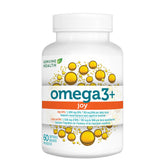For the past twenty years or so, people have been talking about the benefits of eating cold-water fish for the richness of their oils in essential omega-3 fatty acids. When we talk about oily fish, we're talking about mackerel, anchovies, sardines, herring, etc..1, 4
Recognition of the very important role played by omega-3s in the prevention and treatment of depression puts this illness in a different light. What if depression were also an inflammatory disease, as was recently discovered for coronary artery disease? This would explain why this disease is not limited to a lack of the neurotransmitter serotonin, but that inflammation is another important factor to be considered..2, 4, 5
How to identify depression?
At some point in a person's life, a change in mood occurs more or less quickly, in a matter of hours or even days or weeks, with varying degrees of intensity, and the person is no longer as he or she was before. Even if nothing really justifies this persistent malaise, it tends to worsen and become depression..2, 4, 5
Second brain, mood and neurotransmitters
Did you know that a large proportion of our emotions are probably influenced by the nerves in our gut? In other words, day-to-day emotional well-being may largely depend on messages sent from the second brain to the first. Recent studies have reported that a significant number of patients with inflammatory bowel disease also suffer from depression and anxiety.
What's more, we learn that just like the brain, the mass of neural tissue in our gut uses 30 different neurotransmitters. Serotonin, nicknamed "the happy chemical", is 95% produced and stored in the gut..6, 10
Inflammation
Many chronic health problems are associated with high levels of inflammation. These include arthritis, chronic pain, fibromyalgia, skin problems (eczema and psoriasis), asthma, inflammatory bowel diseases such as ulcerative colitis, Crohn's disease, irritable bowel syndrome, intestinal polyps, and so on.
Today, depression is also thought to be partly inflammatory..4, 6
Omega-3, depression and inflammation
The omega-3 fatty acids found in fish include DHA, or docosahexaenoic acid, and EPA, or eicosapentaenoic acid. Well-documented research has attributed anti-inflammatory effects to EPA.
For example, EPA inhibits the production of pro-inflammatory cytokines such as prostaglandin E2 (PGE2) from arachidonic acid (AA). EPA can also influence cell signalling and neurotransmitter production in the brain. In addition, EPA has been shown to lower cortisol levels in people suffering from major depression.
In short, omega-3s also lower the concentration of the dangerous cartilage-destroying factors in arthritis, cytokines, TNF and IL-1B (inflammatory markers)..3, 6, 7, 8
Glossary
- Cytokines Cytokines are hormones of the immune system.
- Prostaglandins Prostaglandins: A lipid chemical mediator associated with cell membranes and synthesized in most tissues, they play a role in the inflammatory response.
- Arachidonic acid Arachidonic acid (AA) triggers a chain of reactions that generates type 2 and 4 eicosanoids (E2, E4), which are highly pro-inflammatory.
Arachidonic acid is a non-essential fatty acid of the omega-6 family. It is mainly found in poultry meat, but there are also vegetable sources of omega-6: roasted or grilled sunflower seeds, dehydrated pine nuts, dehydrated walnuts, grape seed oil, etc.
To calm inflammation, reduce dietary sources of omega-6 and increase dietary sources of omega-3.
A balanced diet should provide five omega-6 molecules for every omega-3 molecule.
- Cortisol : Cortisol is a hormone secreted by the adrenal glands that rises in times of stress. If it persists for too long, it can have negative effects, such as disrupting sleep, leading to weight gain, etc..3, 4, 7, 8, 9, 10
Omega-3 and mood
Over the past century, cases of depression have increased dramatically. Nearly 14 million Americans suffer from it. This increase can easily be linked to a decrease in fish and fish oil consumption over the same period.
A large body of research indicates that EPA has powerful antidepressant and mood-stabilizing effects..2, 4, 7, 10
Mood balance: the Omega-3 + Joy supplement
Genuine Health has concocted the formula Omega-3 + Joy formula with a higher EPA concentrate, clinically proven to help promote healthy mood balance, improve well-being and support cognitive health and brain function.
In autumn, it can relieve symptoms of seasonal depression. Omega-3 + Joy may also reduce health problems associated with chronic inflammation. Omega-3+ Joy is available in the following forms enteric-coated capsules or in liquid form.11
Omega-3 + Joy is mood-boosting, anti-inflammatory, sustainably sourced and wild-crafted. Gluten-free and GMO-free, this formula is pure and powerful.
Recipe for a shake with Omega-3 + Joy
- 1 cup mixed berries (fresh or frozen)
- 1/2 cup almond milk (unsweetened) or oat milk, soy milk, etc.
- 3/4 cup water
- 1 scoop vanilla protein powder (hemp or other)
- 1/2 cup kale
- 1 tsp. fish oil Omega-3 + Joy
Liquefy in blender and serve.
Omega-3 + Joy means good emotional and overall health!
About the author
Marie Couture, Certified Naturopath
Specialized in :
- Digestive disorders
- Inflammation
- Hormonal problems
- Stress management
References :
- Frappier Renée, Gosselin, Le guide des bons grasÉditions Asclépiades Inc. 1995, 403 pages
- Gérard Dr. Alain with CRED, Depression, the disease of the centuryAlbin Michel, 2010, 230 pages
- Marieb Élaine, Human anatomy and physiologyERPI, 1999, 1194 pages
- Sears Dr. Barry, The Omega DietLes Éditions de l'homme, 2002, 405 pages
- Servan-Schreiber David, HealingRobert Laffont, 2003, 301 pages
- Role and benefits of the microbiota, La Semaine Santé, Thérien Paul
- Relieving anxiety through diet, Vitalité Québec, Valérie Conway, Ph.D, ND.A
- Targeted use of fish oil, Fleurir, Philip Rouchotas, Msc, ND, and Heidi Fritz, MA, ND




